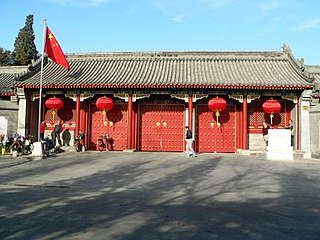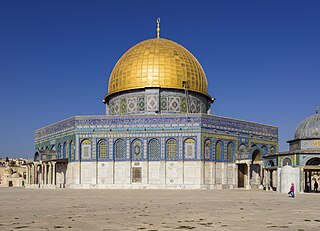
Israelis are the citizens and nationals of the State of Israel. The country's populace is composed primarily of Jews and Arabs, who respectively account for 75 percent and 20 percent of the national figure; followed by other ethnic and religious minorities, who account for 5 percent.
The Fulbright Program, including the Fulbright–Hays Program, is one of several United States Cultural Exchange Programs with the goal of improving intercultural relations, cultural diplomacy, and intercultural competence between the people of the United States and other countries through the exchange of persons, knowledge, and skills. Via the program, competitively-selected American citizens including students, scholars, teachers, professionals, scientists, and artists may receive scholarships or grants to study, conduct research, teach, or exercise their talents abroad; and citizens of other countries may qualify to do the same in the United States.

The United Front Work Department is a department of the Central Committee of the Chinese Communist Party (CCP) tasked with "united front work." It gathers intelligence on, manages relations with, and attempts to gain influence over elite individuals and organizations inside and outside mainland China, including in Hong Kong and Taiwan.

According to a 2009 Pew Research Center report, 93.1% of Turkmenistan's population is Muslim. Traditionally, the Turkmen of Turkmenistan, like their kin in Uzbekistan and Afghanistan are Sunni Muslims. Shia Muslims, the other main branch of Islam, are not numerous in Turkmenistan, and the Shia religious practices of the Azerbaijani and Kurdish minorities are not politicized. The great majority of Turkmen readily identify themselves as Muslims and acknowledge Islam as an integral part of their cultural heritage, but some support a revival of the religion's status primarily as an element of national revival.

The Ministry of Internal Affairs of Belarus, abbreviated МUS (МУС) in Belarusian and MVD (МВД) in Russian, is a body of the Belarusian Government that is charged with the internal affairs of Belarus. Day to day law enforcement is carried out by the Militsiya. The Ministry is also tasked with providing security to state buildings and officials. Organizations such as the Presidential Guard are under the control of the Ministry. The clearing of landmines is among the tasks of the ministry.
Vietnamese Australians are Australians of Vietnamese descent. Vietnamese Australians are one of the largest groups within the global Vietnamese diaspora. At the 2021 census, 334,781 people stated that they had Vietnamese ancestry, representing 1.3% of the Australian population. In 2021, the Australian Bureau of Statistics estimated that there were 268,170 Australian residents who were born in Vietnam.

State Islamic University Syarif Hidayatullah Jakarta is a public university in Indonesia, located in Ciputat, South Tangerang, Banten.
The California Bureau for Private Postsecondary and Vocational Education (BPPVE) was a unit of the California Department of Consumer Affairs whose purpose was to protect students by establishing academic standards for private institutions of higher education in California. BPPVE approval or exemption was required by the State of California to ensure consumer safety from fraudulent or substandard education providers. The agency ceased operation on July 1, 2007, when the legislative authority for its creation expired. A new agency, the California Bureau for Private Postsecondary Education, took its place on January 1, 2010.

The Bureau of Democracy, Human Rights and Labor Affairs (DRL) is a bureau within the United States Department of State. The bureau is under the purview of the Under Secretary of State for Civilian Security, Democracy, and Human Rights.

The National Religious Affairs Administration (NRAA), formerly the State Administration for Religious Affairs (SARA), is an external name of the United Front Work Department of the Central Committee of the Chinese Communist Party (CCP). Formerly, it was an executive agency directly under the State Council of the People's Republic of China which oversaw religious affairs in the country. SARA was merged into the UFWD in 2018. The names of the former agency were retained by the UFWD as external names under the system called "one institution with two names".

Islam is the second-largest religion in Israel, constituting 1.707 million and around 18.1% of the country's population as of 2022. The ethnic Arab citizens of Israel make up the majority of its Muslim population, making them the largest minority group in Israel.

Mozambique is a secular state with a majority Christian population and substantial minorities of the adherents of traditional faiths and Sunni Islam.

The majority of the population of East Timor is Christian, and the Catholic Church is the dominant religious institution, although it is not formally the state religion. There are also small Protestant and Sunni Muslim communities.
The constituent departments of the State Council are the principal units of State Council of the People's Republic of China. Types of departments include ministries, commissions, the People's Bank of China and the National Audit Office.
Religion in Guinea is approximately 89% Muslim, 7% Christian, with 2% adhering to indigenous religious beliefs in 2022. There are also smaller numbers of Atheists and practitioners of other religions in the country. Much of the population, both Muslim and Christian, also incorporate indigenous African beliefs into their outlook.

The Bureau of Buddhist and Tibetan Affairs, or Xuanzheng Yuan was a government agency of the Mongol-led Yuan dynasty of China to handle Buddhist affairs across the empire in addition to managing the territory of Tibet. It was originally set up by Kublai Khan in 1264 under the name Zongzhi Yuan or the "Bureau of General Regulation", before it was renamed in 1288.

The Ministry of State Secretariat is a government ministry responsible for providing technical, administrative, and analytical support to the President and Vice President in the exercise of their state powers. The current minister of state secretariat is Pratikno, who previously served as Rector of Gadjah Mada University in Yogyakarta.
The status of religious freedom in Africa varies from country to country. States can differ based on whether or not they guarantee equal treatment under law for followers of different religions, whether they establish a state religion, the extent to which religious organizations operating within the country are policed, and the extent to which religious law is used as a basis for the country's legal code.

"One institution with two names" is an arrangement where a Chinese government agency exists in name only, and its functions are in practice performed by another government agency or a Chinese Communist Party (CCP) organization, so that in effect one institution has two or more official names for political, historical, or bureaucratic reasons. This type of arrangement was historically common until the mid-1980s, but has been extensively revived under reform measures instituted in 2017-2018. Generally, the purpose of retaining the name of the state institution is so that the party institution has the option of using it where it may be legally or aesthetically appropriate. For example, one name can be used domestically and another used when dealing with institutions outside China. The arrangement can be achieved by either "adding a name" or "externally reserving a name".












